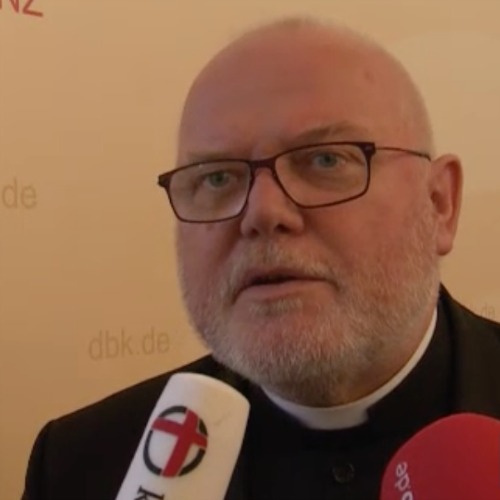
Cardinal Reinhard Marx of Munich and Freising is the president of the German Bishops’ Conference. (dbk.de)
For German Bishops, Sacramental Mercy Has a Price
Since 2012, critics note, the German bishops have denied the sacraments to those who opt out of paying Germany’s ‘church tax.’
By ROD DREHER
CNA/EWTN NEWS
BERLIN — As Cardinal Walter Kasper prepares to receive an award and give a speech at The Catholic University of America later today, some are accusing him and his episcopal colleagues of Germany of hypocrisy.
The critics point out that while Cardinal Kasper and most of his fellow German bishops have been leading the charge to allow those in “irregular” marital situations — those who are divorced and remarried — to receive Communion, they have simultaneously denied the sacraments, including confession, to those who opt out of paying Germany’s “church tax.”
In both cases, the German position is at odds with Church teaching: admitting to Communion those formally not allowed and forbidding those whom the Vatican says can validly receive the sacraments.
The German definition of mercy, critics say, is a “pay-to-pray system” that has its “financial” limits.
The bishops in Germany “are notoriously the most merciful in wishing to grant Communion to the divorced and remarried, but at the same time are the most ruthless in de facto excommunicating those who refuse to pay the church tax, which in their country is obligatory by law,” Vatican analyst Sandro Magister wrote Oct. 29 in his Settimo Cielo blog for Italy’s L’Espresso newspaper.
The church tax earned the Church in Germany an income of more than $7 billion in both 2012 and 2013.
The critics charged that the German bishops are on one hand saying that mercy demands Communion be given to those living in what Christ called adultery, while simultaneously banning those who may be living according to Church teaching but for whatever reason choose not to pay their church tax from all the sacraments.
“In Germany, the church tax (kirchensteuer) is obligatory, such that to be able to not pay it one must declare his departure from the church to which he belongs, whether Catholic or Protestant, by a public act made before a competent civil authority,” Magister explained.
When Germans register as Catholic, Protestant or Jewish on their tax forms, the government automatically collects an income tax that amounts to 8% or 9% of their total income tax or 3% to 4% of their salary.
The church tax is given to the religious communities, rather than those communities collecting a tithe. The Church uses its funds to help run its parishes, schools, hospitals and welfare projects.
Many Germans have de-registered in recent years, so as to avoid paying the additional tax. Magister noted that the number of persons declaring their departure from the Church has been substantial — in 2010, the figure was more than 180,000.
The number of de-registrations has been heightened this year, as the church tax is now being withheld from capital gains as well as from salary.
Many of those who have de-registered from the Church on the German government’s forms continue to practice the faith and have de-registered to avoid the tax altogether or to support the Church with private tithes.
In response to the de-registering, the German bishops issued a decree in September 2012 calling such departures “a serious lapse” and listing a number of ways such individuals are barred from participating in the life of the Church.
The decree specified that those who do not pay the church tax cannot receive the sacraments of confession, Communion, confirmation or anointing of the sick, except when in danger of death; cannot hold ecclesial office or perform functions within the Church; cannot be a godparent or sponsor; cannot be a member of diocesan or parish councils; and cannot be members of public associations of the Church.
If those who de-registered show no sign of repentance before their death, they can even be refused a religious burial.
While these penalties have been described as “de facto excommunication,” the Pontifical Council for Legislative Texts wrote in a March 13, 2006, document that opting out of taxes in a civil situation was not the same as renouncing the faith, and thus excommunication did not apply to such persons.
The German group Union of Associations Loyal to the Pope has said it is ironic that one could reject Church teaching on any number of issues, including the indissolubility of marriage, and still be considered Catholic — as long as one paid the church tax.
The group charged that the “selling of sacraments” through the tax system is even worse than the abuses protested by Martin Luther at the start of the Protestant Reformation.
___
http://www.ncregister.com/daily-news/for-german-bishops-sacramental-mercy-has-a-price#ixzz3Ig65diXd